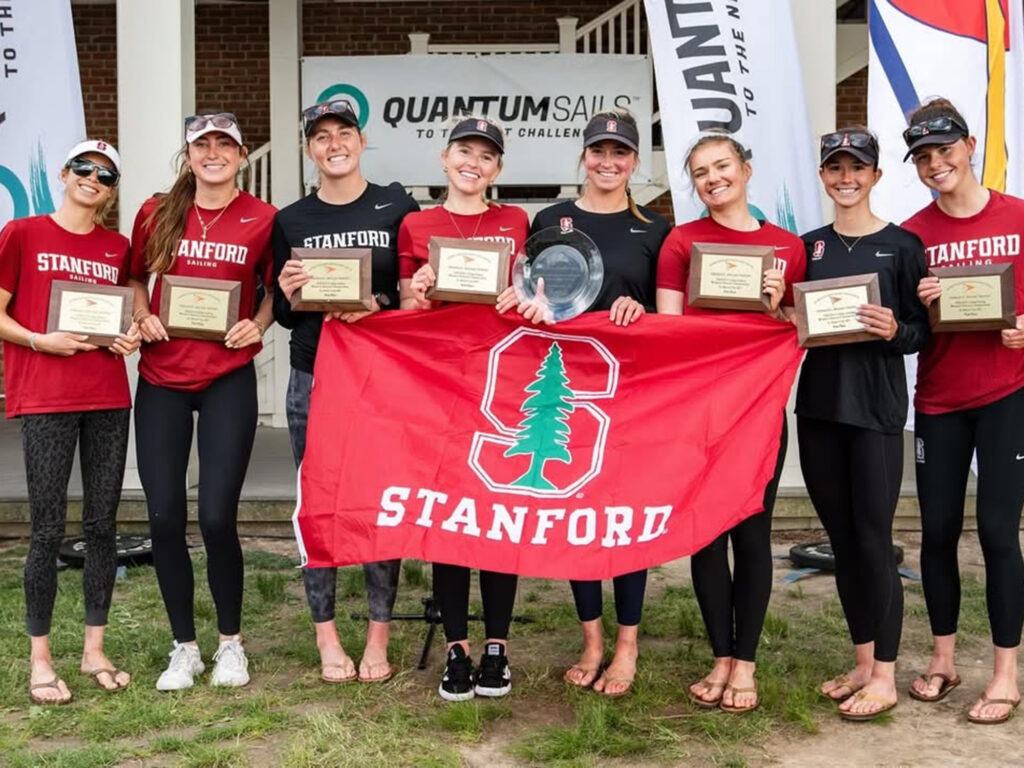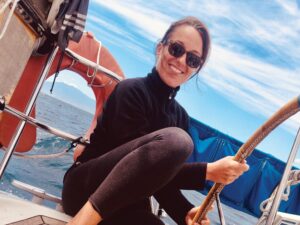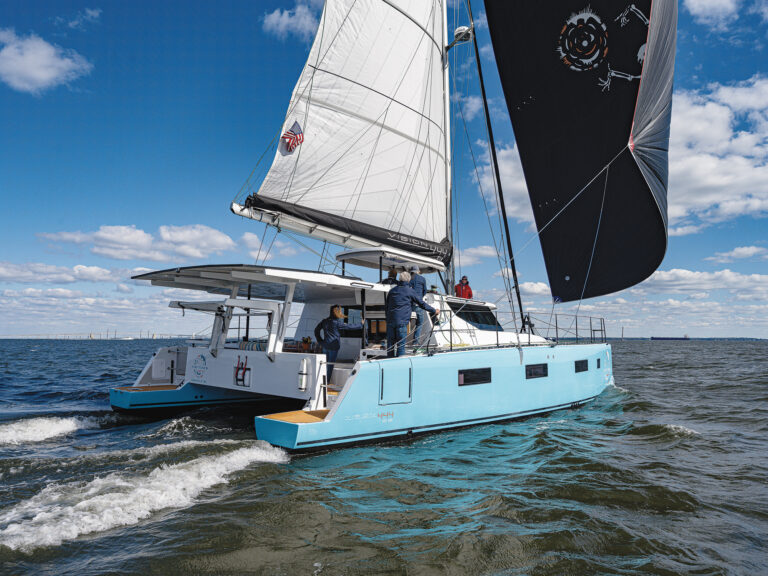
For the third year running, Stanford University’s women’s sailing team has claimed the top of the podium at the College Sailing Women’s Fleet Race Nationals, making them just the fourth program in history to accomplish a three-peat. But beyond the Cardinal’s dominant performance on the water in Annapolis, Maryland, their victory is a reflection of something even more powerful: the growing strength, visibility, and momentum of women in sailing.
Stanford sealed the win with an 11-point lead, propelled by a stellar showing in A Division from skipper Vanessa Lahrkamp (‘26) and crews Alice Schmid (‘27) and Ashtyn Tierney (‘28), who won their division by an impressive 24-point margin—earning them the Low Point A Division trophy. The result marked yet another high for Lahrkamp, who was recently named Quantum Women’s Sailor of the Year for the second consecutive season.
“We train a lot and I think without great teammates and without great sparring partners at Stanford University it would really not be possible,” said Lahrkamp, noting the team’s collective work ethic both on and off the water. “We’re in the gym together, we do social events together, we’re eating together to make that teamwork even stronger than it already is.”
Lahrkamp’s words echo a truth that has become increasingly visible across the sport: sailing success—especially in college—is not just about individual skill, but about program culture, peer mentorship, and support systems.
More Than a Win—A Movement
This year’s championship brought that culture into sharper focus. Tulane and Harvard completed the podium, and a breakout performance by George Washington University’s all-women B Division team turned heads. Skipper Arrieta Angueira Salbidegoitia (‘26), with crews Ella Adelman (‘26) and Caitlyn Schwartz (‘28), clawed their way from sixth to second in their division—GW’s best-ever finish.
Even more impressive? They did it as a student-run club team, no longer officially part of their school’s varsity athletics program.
“We have been trying so hard as a team to prove that we can do well without the same help other teams get,” Angueira Salbidegoitia said. “We were already super excited to make finals at nationals. We went into this with high expectations but knowing that we have been working hard to do well.”
That determination—especially from teams operating without the same institutional resources—mirrors a broader push in the sailing world for inclusion, representation, and equity. More young women are showing up at regattas, more women are coaching top teams, and more female sailors are earning leadership roles on the water.
College Sailing as a Launchpad
Women’s college sailing has long served as a proving ground for talent that will later make waves at the Olympic, professional, and offshore levels. From alumni like Olympic gold medalist Anna Tunnicliffe Tobias to Vendée Globe hopefuls like Francesca Clapcich, many of today’s most accomplished sailors honed their skills in college dinghies.
With initiatives like US Sailing’s Women’s Sailing Leadership Forum, The Magenta Project, and mentorship pipelines forming across yacht clubs and national teams, today’s collegiate standouts are stepping into a sailing world that is—finally—starting to welcome their ambition.
And yet, for many women sailors, especially at the college level, the path is still uphill. Resource disparities between varsity and club teams, limited female head coaches, and funding gaps remain. That’s why results like GW’s and Stanford’s don’t just signal program strength—they spotlight progress.
As the sport continues to evolve, the stories behind this year’s College Sailing Nationals will resonate far beyond one regatta. They’re evidence of something that’s been building: women are not only competing at the highest levels—they’re reshaping the sport.
Women’s Sailing Powerhouses: College Programs to Watch
As women’s sailing gains traction across the U.S., several collegiate programs are emerging as consistent leaders—developing talent, fostering community, and racking up national titles. Whether varsity-funded or scrappy club teams, these programs are shaping the future of the sport.
Stanford University
- Status: Varsity
- Region: Pacific Coast
- Notable: Three-time defending Women’s Fleet Race National Champions (2022–2024)
- Strengths: Elite athlete development, strong team culture, top-tier coaching
Tulane University
- Status: Varsity
- Region: South Atlantic
- Notable: 2024 Women’s Nationals runner-up
- Strengths: Deep women’s roster, excellent results across both A and B divisions
Harvard University
- Status: Varsity
- Region: New England
- Notable: Consistent top finishes in national competition
- Strengths: Legacy program with strong recruiting and technical depth
George Washington University
- Status: Club (formerly varsity)
- Region: Mid-Atlantic
- Notable: Historic 2024 B Division runner-up finish
- Strengths: Self-managed team with rising talent and gritty determination
Brown University
- Status: Varsity
- Region: New England
- Notable: Strong history in both coed and women’s championships
- Strengths: Balanced team strategy and experienced coaching staff
Boston College
- Status: Varsity
- Region: New England
- Notable: Regular top-eight finishes at nationals
- Strengths: High sailing IQ, consistent team leadership, and solid regatta performance
Interested in learning more? Visit collegesailing.org for rankings, team profiles, and information on how to get involved in college sailing.








